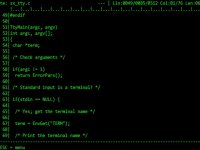FloppySoftware
Member
TE v1.70 has just been released!
TE is a text editor for CP/M and Z80.
Now, thanks to TECF, the TE configuration tool, you can
configure TE even more:
- configuration name
- screen size ("auto" for CP/M 3 auto-detection)
- layout characters
- main key names
- key bindings

http://www.floppysoftware.es/te.html
https://github.com/MiguelVis/te
TE is a text editor for CP/M and Z80.
Now, thanks to TECF, the TE configuration tool, you can
configure TE even more:
- configuration name
- screen size ("auto" for CP/M 3 auto-detection)
- layout characters
- main key names
- key bindings

http://www.floppysoftware.es/te.html
https://github.com/MiguelVis/te

